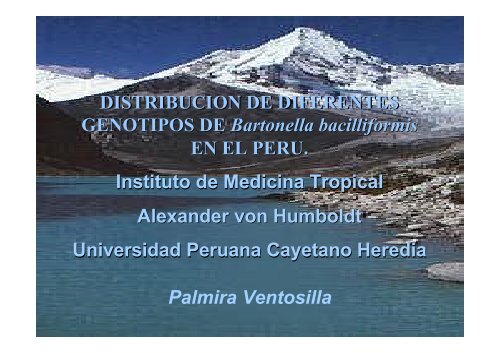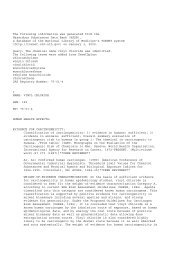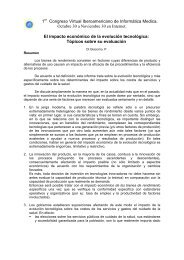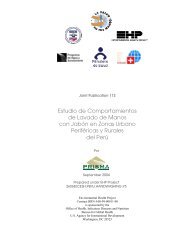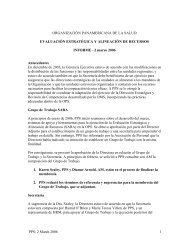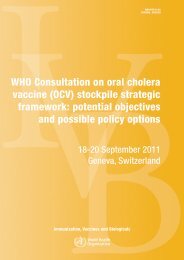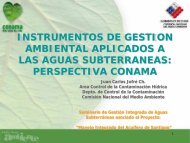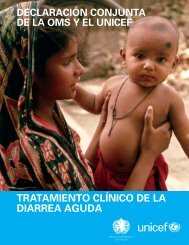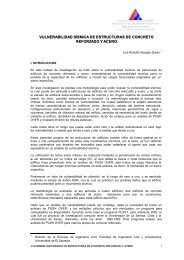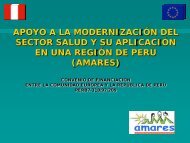DISTRIBUCION DE DIFERENTES GENOTIPOS DE Bartonella ...
DISTRIBUCION DE DIFERENTES GENOTIPOS DE Bartonella ...
DISTRIBUCION DE DIFERENTES GENOTIPOS DE Bartonella ...
Create successful ePaper yourself
Turn your PDF publications into a flip-book with our unique Google optimized e-Paper software.
<strong>DISTRIBUCION</strong> <strong>DE</strong> <strong>DIFERENTES</strong><br />
<strong>GENOTIPOS</strong> <strong>DE</strong> <strong>Bartonella</strong> bacilliformis<br />
EN EL PERU.<br />
Instituto de Medicina Tropical<br />
Alexander von Humboldt<br />
Universidad Peruana Cayetano Heredia<br />
Palmira Ventosilla
INTRODUCTION<br />
www.pitt.edu/~super1/lecture/lec8711/index.htm
www.pitt.edu/~super1/lecture/lec8711/index.htm
TAXONOMIA<br />
CLASE Alfa Proteobacteria<br />
SUBCLASE<br />
-2 Proteobacteria<br />
FAMILIA<br />
<strong>Bartonella</strong>ceae<br />
GENERO<br />
<strong>Bartonella</strong><br />
ESPECIES<br />
B. alsatica, B. bacilliformis, B. birtlesii, B. clarridgeiae, B. doshiae,<br />
B. elizabethae, B. grahamii, B. henselae, B. koehlerae, B. peromysci,<br />
B. schoenbuchensis, B. schoenbuchii* , B. talpae, B. taylorii,<br />
B. tribocorum, B. vinsonii, B. quintana.<br />
* Bergey, 2 Enero del 2002.<br />
http://dx.doi.org/10.1007/bergeysoutline
FACTORES <strong>DE</strong> VIRULENCIA<br />
1. <strong>DE</strong>FORMINA<br />
Proteína extracelular de 67kDa
2. MOVILIDAD<br />
La flagelina es una proteína de 42 kDa.<br />
Se expreso la flagelina de B.<br />
bacilliformis en E. Coli: Se amplificó por<br />
PCR el gen fla A e insertó en el plásmido<br />
pGEM-T, obteniéndose la construcción<br />
pAEfla. Esta se transfirió a E. coli<br />
BL21(<strong>DE</strong>3) dando una buena expresión de<br />
flagelina (PAGE-SDS).<br />
Se evaluará su capacidad antigénica<br />
de la flagelina, proteinas de invacióm<br />
IaIA en IaIB en ratones BalB/c.<br />
Clonamiento y expresión del gen de flagelina de <strong>Bartonella</strong><br />
bacilliformis EN Escherichia coli. García-de-la-Guarda, R., Alvarado,<br />
D., Lozano, O., Flores, L, Guerrero, A. M., Ventosilla, P., Guerra, H.,<br />
Coha, J. M., Ramírez, P. y Romero C. IC, 2002-2003.
INVASION<br />
En resumen, las proteínas como la flagelina, ialAB,<br />
deformina, RhoA, y el antígeno de 43 kDa han empezado a<br />
ayudar a entender los mecanismos moleculares para la<br />
invasión de B. bacilliformis a los eritrocitos. Las funciones<br />
de estas proteínas todavía no se conocen totalmente,<br />
Yanji Xu and Yan Chai <strong>Bartonella</strong> bacilliformis: Molecular Mechanisms of Invasion. Einstein<br />
Quart. J. Biol. Med. (2002) 19:56-58.
Modelo de ingreso de <strong>Bartonella</strong> bacilliformis al glóbulo rojo<br />
Rolain JM, Novelli S, Ventosilla P, Maguina C, Guerra H, Raoult D. Immunofluorescence detection of B. bacilliformis<br />
flagella in vitro and in vivo in human red blood cells as viewed by laser confocal microscopy. Ann N Y Acad Sci. 2003<br />
Jun;990:581-4
Mayo-1998: Brote de<br />
Cusco en “El Sagrado<br />
Valle de los Incas”,<br />
Urubamba.<br />
•Llego al Laboratorio del IMT-UPCH 4+1 muestras de sangre.<br />
•Los cultivos se hicieron positivos a 7 días, a las colonias se les<br />
hicieron PCR e IFI, y se confirmo el diagnóstico de B. bacilliformis.<br />
Ventosilla P, López M, Antúnez de Mayolo A, Guerra H, Merello J, Pérez E, Maguiña C,<br />
Montoya M. <strong>Bartonella</strong> bacilliformis en el Valle Sagrado Cusco, Perú 1998: Aislamiento e<br />
identificación por PCR e IFI. X Jornadas Científicas Homero Silva Díaz, 1998: 47<br />
Ventosilla P. http://euwog.free.fr/archive/meeting_juin99/proceeding.doc,<br />
Henriquez C, Infante B, Merello J. Gallino M, Santivañez L, Maguiña C, Guerra H, Birtles R,<br />
Ventosilla P. Identificación de <strong>Bartonella</strong> bacilliformis por métodos moleculares. Rev Med<br />
Hered 2002; 13:58-63.
WHO/TDR<br />
Pérez E., Ogusuku E., Ventosilla P., Birtles R., Guerra H., Merello J., Infante B.<br />
and Montoya M., Lutzomyia peruensis, probable vector of <strong>Bartonella</strong> bacilliformis<br />
in the Sacred Valley of the Incas, Cusco, Peru, 1998. 65th Annual Meeting of the<br />
AMCA the American Mosquito Control Association. February 21-24. St. Louis,<br />
Missouri. Pg. 42.<br />
Villaseca P, Padilla C, Ventura G, Samalvides F, Yañez H, Chevarría L, Ellis B,<br />
Rotz L, Leake J, Beati L.Rev Med Exp 1999, XV (1-2). Importancia de la<br />
Lutzomyia peruensis en la transmisión de la enfermedad de Carrión en el Valle<br />
Sagrado de los Incas. Urubamba-Cusco, Perú.
Identification of <strong>Bartonella</strong><br />
bacilliformis genotypes and their<br />
relevance to epidemiological<br />
investigations of human bartonellosis.<br />
Birtles R, Fry N, Ventosilla P,<br />
Cáceres A, SánchezS<br />
E, Vizcarra H,<br />
Raoult D.<br />
J. Clin Microbiol 2002; 40:3606-12
FLOWCHART<br />
Colony<br />
Estraction<br />
(QIAamp)<br />
Amplification<br />
Citrate Syntetase gene<br />
(gltA-443f-1137r)<br />
Amplification<br />
ISR (16s-23s rRNA)-<br />
16S1386f-23S115r<br />
AFLP<br />
Purify (Qiagen)<br />
Purify (Qiagen)<br />
Sequencing<br />
Sequencing
AFLP analysis<br />
• Standard Europena Working Group on Legionella<br />
Infection protocol (Fry, N. K., J. M. Bangsborg, S. Bernander, J.<br />
Etienne, B. Forsblom, V. Gaia, P. Hasenberger, D. Lindsay, A. Papoutsi,<br />
C. Pelaz, M. Struelens, S. A.Uldum, P. Visca, and T. G. Harrison. 2000.<br />
Assessment of intercentre reproducibility and epidemiological<br />
concordance of Legionella pneumophila serogroup 1 genotyping by<br />
amplified fragment length polymorphism analysis. Eur. J. Clin.<br />
Microbiol. Infect. Dis. 19:773–780).<br />
- Be used selective primer PstI-C<br />
- Adapter-oligonucleotide (AFLP-LG1, 5-<br />
CTCGTAGACTGCGTACATGCA-3;<br />
AFLP-LG2, 5-TGTACGCAGTCTAC-3).
gltA A Analysis<br />
gltA analysis. Partial gltA sequences of about 700 bp were<br />
obtained for all isolates. Comparison of these sequences revealed<br />
that the isolates possessed one of two different sequences.<br />
The two isolates obtained from the Huayllacayan<br />
valley in 1990 and the Luc-Uba isolate possessed an identical<br />
sequence that was 97% similar to that of the remaining 23<br />
isolates, including the type strain, KC583. These two sequences<br />
had been deposited in GenBank prior to this study.
TABLE 2. ISR sequence Variation among the six B. bacilliformis<br />
genotypes identified.
<strong>DISTRIBUCION</strong> <strong>DE</strong> LOS SEIS <strong>GENOTIPOS</strong><br />
<strong>DE</strong> B. bacilliformis EN EL PERU, 19941-1999.
Conclusiones y Discusión<br />
• Los tres métodos empleados en este estudio permitieron<br />
diferenciaciones de los aislados de B. bacilliformis.<br />
•La sensibilidad del análisis de secuencia de gltA fue mucho<br />
menor que la de AFLP y ISR.<br />
• Con parcial secuencia gltA se obtuvo solo 2 genotipos.<br />
•Con ISR se encuentra 6 genotipos mientras que para AFLP 5<br />
genotipos<br />
• Una combinación de análisis permite detectar la arquitectura<br />
genómincas de las bacterias. Pero debe ser tomado con cuidado el<br />
querer hacer una análisis a nivel epidemiológico.
Conclusión n y Discusión<br />
• Los tres últimos brotes cada uno tiene un mismo genotipo, la<br />
pregunta es si esta podría corresponder a un significado<br />
epidemiológico, ya que también se encontró diferentes genotipos<br />
en Ancash, zona endémica.<br />
•Por otro lado tenemos cepas de mas de 40 años, que pareciera<br />
tener un buen grado de estabilidad genética.<br />
•Sin embargo los recientes brotes y la expansión de las áreas en<br />
riesgo aun continua en la duda.<br />
•El fenómeno del niño también pude modulara estos cambios<br />
epidemiológicos de la Bartonellosis.<br />
• Este es el primer estudio donde se demuestra que la cepa asilada<br />
de una persona asintomática es del mismo genotipo que las cepas<br />
de pacientes sintomáticos.
Estudios futuros<br />
Proyecto genoma de <strong>Bartonella</strong> bacilliformi<br />
Librería genomica<br />
Secuenciamiento y edición<br />
Camino a la vacuna


